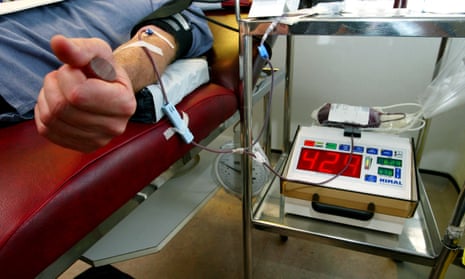US government health officials are lifting the nation’s 32-year-old lifetime ban on blood donations from gay and bisexual men, but major restrictions will remain on who can donate.
The ban had been aimed at preventing the transmission of HIV, the virus which causes Aids, but medical groups and gay activists have long said the ban could no longer be justified, based on modern testing methods. The US Food and Drug Administration said on Monday that the change is “backed by sound science and continues to protect our blood supply”.
Officials are replacing the blanket ban with a policy barring donations from men who have had sex with another man in the previous year. While the policy has been criticized by activists, the FDA stance is in line with that of other countries, including Australia and Britain. The US lifetime ban was put in place during the early Aids crisis.
The agency said people with hemophilia and related blood-clotting disorders will continue to be banned from donating blood due to potential harm they could suffer from large needles. Previously they were banned due to an increased risk of transmitting HIV.
The agency said it has also put in place a safety monitoring system for the blood supply, which it expects to provide “critical information” to help inform future FDA blood donor policies.
“Ultimately, the 12-month deferral window is supported by the best available scientific evidence, at this point in time, relevant to the US population,” Dr Peter Marks, deputy director of the FDA’s biologics division, said in a statement. Several countries, including the United Kingdom and Australia, have 12-month deferrals.
During the change in Australia from an indefinite blood donor deferral policy – essentially a ban – to a 12-month deferral, studies evaluating more than eight million units of donated blood were performed using a national blood surveillance system, the FDA said.
“These published studies document no change in risk to the blood supply with use of the 12-month deferral,” the agency said. “Similar data are not available for shorter deferral intervals.”
The agency said its policies to date have helped reduce HIV transmission rates from blood transfusions from 1 in 2,500 to 1 in 1.47 million.
But many medical providers and activists working directly in HIV/Aids said the new policy is still discrimination.
“In practice, the new policy is still a continuation of the lifetime ban and ignores the modern science of HIV-testing technology while perpetuating the stereotype that all gay and bisexual men are inherently dangerous,” said Kelsey Louie, the executive director of the Gay Men’s Health Crisis, a leader in HIV/Aids providing care, after the announcement. “Blood donation policies should be based on science, not stigma.”
GMHC sees the focus on abstinence as just a continuation of stigma towards gay and bisexual men in the US, even stating the US needs to stop “reacting to HIV like it is the early 1980s”.
And some elected officials rushed to agree.
“It is ridiculous and counter to the public health that a married gay man in a monogamous relationship can’t give blood, but a promiscuous straight man who has had hundreds of opposite-sex partners in the last year can,” said Colorado representative Jared Polis in a statement after the announcement.
“There is no scientific reason to impose a celibacy requirement on gay men before they can donate blood,” he continued.
In an official statement released by the congressional LGBT Equality Caucus calling for the FDA to end all bans on gay and bisexual men from donating blood, congressional members pointed to a 2014 FDA BloodDROPS survey, which found that found the prevalence of HIV in gay and bisexual male blood donors was just 0.25%, which is actually lower than the overall prevalence in the US of 0.38%.
“This past year, we saw tremendous progress for the LGBT community with the legalization of same-sex marriage nationwide,” said Illinois congressman Mike Quigley.
“Unfortunately, today’s official policy change by the FDA on blood donations from men who have sex with men from a lifetime ban to one-year deferral does not keep up with that same progress.”
Zach Stafford, Reuters and the Associated Press contributed to this report.
